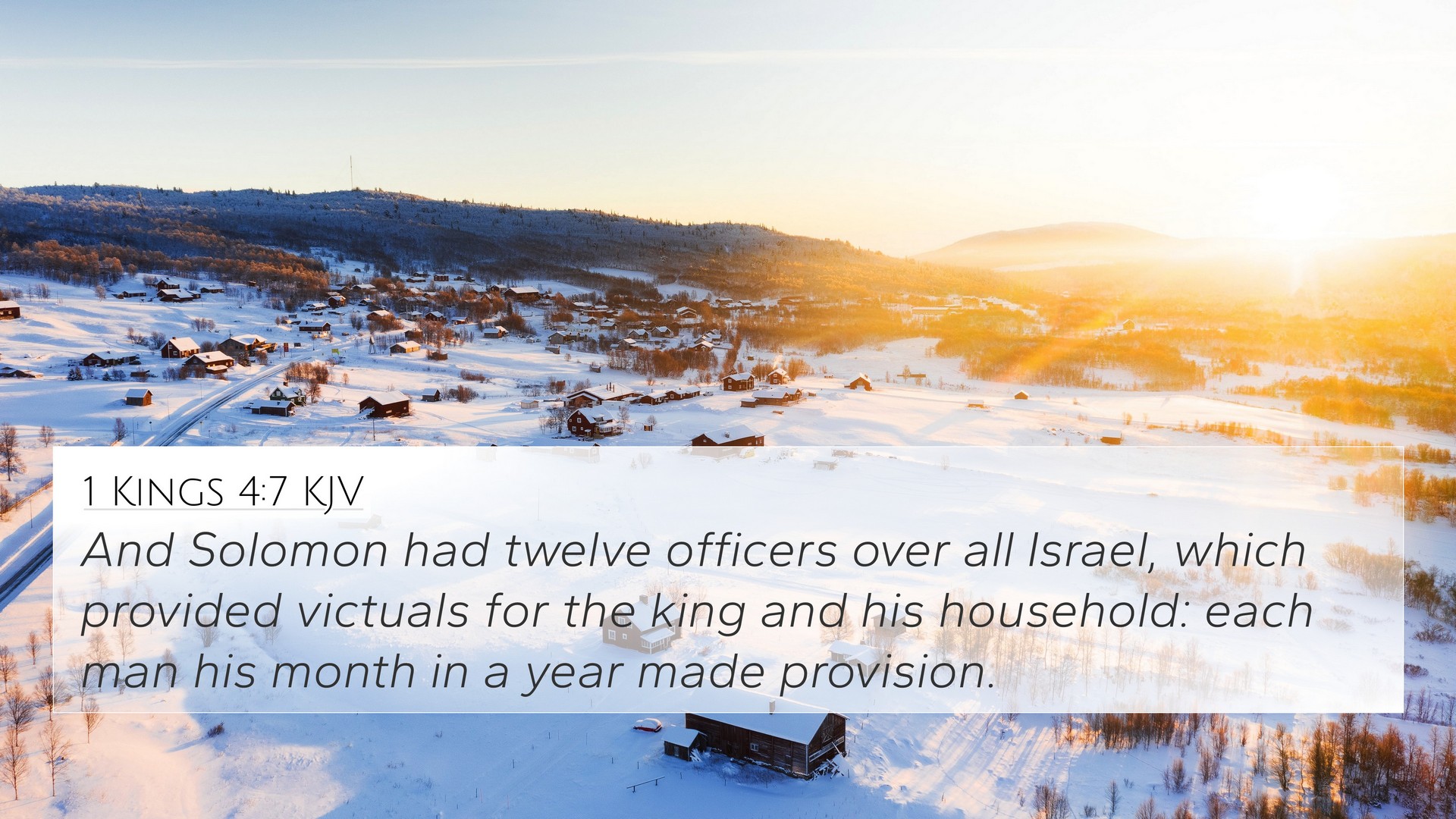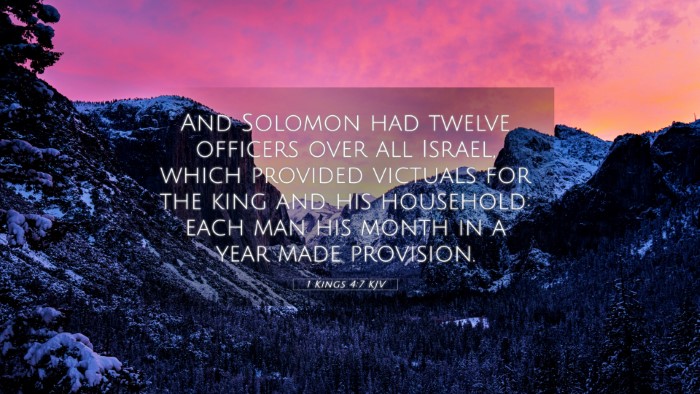Understanding 1 Kings 4:7
Bible Verse: “And Solomon had twelve officers over all Israel, which provided victuals for the king and his household: each man his month in a year made provision.” (1 Kings 4:7)
Summary of 1 Kings 4:7
This verse highlights King Solomon's organization of his court and the provisions necessary for his household. Solomon appointed twelve officers, each responsible for supplying food for one month of the year. This system illustrates Solomon's administrative efficiency and the wealth of Israel during his reign.
Key Insights from Public Domain Commentaries
-
Matthew Henry: Henry emphasizes Solomon's wisdom in establishing a stable and prosperous kingdom, showing that good governance requires effective resource management. The monthly rotation implies that no one man bore undue burden, reflecting fairness in service.
-
Albert Barnes: Barnes focuses on the practical aspects of governance, noting that the twelve officers symbolize a well-ordered state. This arrangement allowed Solomon to maintain a sustainable supply chain to cater to his needs, signifying the prosperity of Israel.
-
Adam Clarke: Clarke points out that the officers not only provided for Solomon's household but indirectly contributed to the welfare of the entire nation by ensuring that resources were managed wisely. This structure laid the groundwork for Israel's future stability.
Spiritual and Thematic Connections
The organization of Solomon's officers can be tied to broader themes of stewardship and divine order seen throughout the Scriptures. It reflects the necessity of leadership, unity, and shared responsibility within God's people.
Bible Verse Cross-References
- 1 Kings 10:27: Discusses Solomon's wealth and how it reflects his successful governance.
- 2 Chronicles 1:15: Highlights Solomon's resources and wealth accumulated as a result of his wisdom in ruling.
- Proverbs 21:5: Relates to diligent planning and how wise counsel leads to prosperity.
- Matthew 25:14-30: The Parable of the Talents underscores the importance of stewardship and responsible management.
- Luke 12:42: Jesus speaks on wise management, hinting at the value of faithful servants in God's kingdom.
- 1 Timothy 3:5: Suggests that a leader must manage their household well, echoing the principles seen in Solomon's governance.
- Exodus 18:21: Moses' father-in-law advises appointing leaders of thousands, hundreds, and tens for effective administration, connecting with Solomon's method.
Connecting Verses for Deeper Study
Understanding 1 Kings 4:7 in the context of thematic Bible verse connections allows for a richer interpretation:
- John 15:16: Being chosen to bear fruit parallels the responsibilities held by Solomon's officers.
- Acts 6:1-4: The appointment of deacons for food distribution mirrors Solomon's administrative duties.
- Romans 12:7-8: Highlights diverse gifts in service, resonating with the roles of the twelve officers.
Using Cross-References for Bible Study
Employing a Bible cross-reference guide is essential when interpreting connections in verses like 1 Kings 4:7. Here are some tools for effective cross-referencing:
- Bible concordance for identifying key terms.
- Cross-reference Bible study methods to explore thematic links.
- Bible reference resources that highlight prophetic parallels.
The Importance of Inter-Biblical Dialogue
Studying connections between Biblical texts enriches understanding. For instance, considering the governance structures in both Old and New Testament contexts reveals timeless principles of leadership and stewardship crucial for today’s context.
Conclusion
The exploration of 1 Kings 4:7 not only illustrates Solomon's effective leadership but also invokes deeper study through scriptural cross-referencing. By linking this verse to related passages, one can uncover the practical and spiritual applications of stewardship and responsibility.
By engaging with these insights and connections, believers can better understand the greater narrative of the Bible and apply its truths to their lives.



